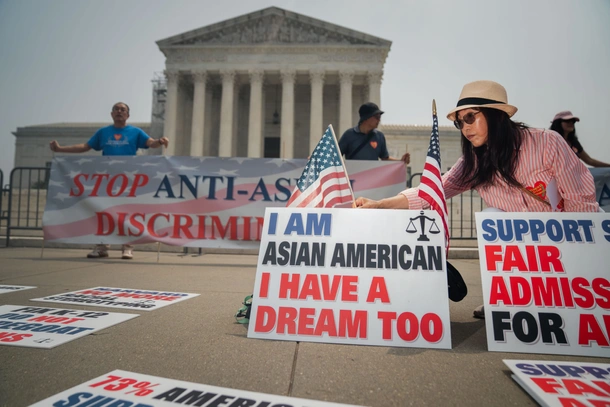Columbia Law School Removes Application Requirement Following Accusations of Evading Affirmative Action Ban
Columbia Law School has eliminated a controversial admission requirement for transfer students following an inquiry from The Washington Free...

Columbia Law School Eliminates Controversial Admission Requirement
Columbia Law School has eliminated a controversial admission requirement for transfer students following an inquiry from The Washington Free Beacon.
The application process had a section that seemed to be a way to circumvent the U.S. Supreme Court's ban on affirmative action.
Supreme Court Ruling on Affirmative Action
In a landmark ruling, the Supreme Court of the United States (SCOTUS) declared that race-based admissions programs at Harvard University and the University of North Carolina violated federal laws. The court found that these programs were in violation of Title VI of the Civil Rights Act and the Equal Protection Clause of the 14th Amendment. This decision is expected to have a significant impact on the admissions processes at universities throughout the country.
Controversy Surrounding Columbia Law School's Admissions Process
The article discusses how some universities in the United States are trying to find loopholes in a recent Supreme Court ruling that eliminated universities' ability to consider race in their admissions process. Specifically, the article mentions that Columbia Law School's admissions page now requires transfer applicants to submit a 90-second video statement addressing random questions. This additional requirement is seen as a way for the university to gain insight into the applicants' personal strengths, potentially allowing them to indirectly consider race in the admissions process.
Columbia Law School has come under scrutiny for using video statements from transfer applicants on their website, following the Supreme Court's ruling against affirmative action policies. Critics argue that this decision by Columbia is an attempt to bypass the requirements of Title VI of the Civil Rights Act. Edward Blum, the founder of Students for Fair Admissions, a nonprofit legal advocacy organization, questions the necessity of these video statements, asking what they can convey that a written statement cannot.
Legal Challenge Against Elite Universities
A legal challenge against elite universities, Harvard and UNC, regarding their admissions processes has been taken to the Supreme Court. The organization behind the challenge, led by Blum, accused the universities of unfairly considering race in their admissions decisions. The group highlighted the high test scores of Asian American and white applicants who were rejected. Ultimately, the Supreme Court ruled against Harvard and UNC.
Removal of Video Statement Component
A law school has removed a video statement component from its application after it was reported by the Free Beacon. The school claimed that the component, which was introduced before a Supreme Court ruling, was a misunderstanding. The removal occurred by 6:00 p.m. on Monday.
According to a statement from a law school, video statements will not be required as part of the Fall 2024 J.D. application. The law school clarified that the requirement was mistakenly listed on their website and has now been corrected.
Alternative Ways to Ask About Race in College Applications
According to a report by watchdog group Campus Reform, some colleges, including Sarah Lawrence College in New York, have found alternative ways to ask about a student's race in their applications. The report states that Sarah Lawrence College asks applicants how the Supreme Court ruling has personally affected them. This information was reported by the New York Post.
